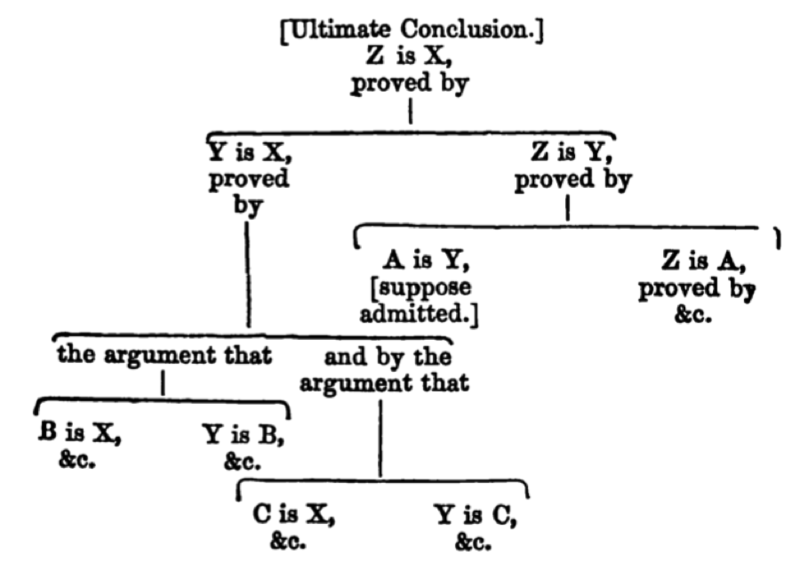Rhetoric
Argumentation, mostly prescriptive
June 7, 2017 — September 18, 2024
Suspiciously similar content
Handy terms and concepts in the realm of argumentation and persuasion. 🏗
1 Why we work by rhetoric
Are our brains intrinsically social? Do we reason best by social means?
Is language “about” reason or about persuasion? That question is explore in another notebook
2 Mind changing
Miscellaneous remedial argumentation (slightly spammy): Eric Barker’s This Is How To Change Someone’s Mind: 6 Secrets From Research advocates self-awareness:
If absolutely nothing else works, they might just be a totally unreachable zealot. Or it could be that…
You’re the zealot. And if you are unwilling to give any serious consideration to this possibility, that’s a big red flag. Nobody thinks they’re the problem — and that’s the problem. After all, you’re the one reading articles about how to change people’s minds, aren’t you? (Yes, I plead guilty to being an accomplice.) It’s just a possibility to consider, but if you’re serious about having fewer arguments to the death, it’s a good idea to make sure you’re really a victim and not Patient Zero. So what do you do if you think you might be Typhoid Mary?
Consider the beliefs you usually argue about. Now ask yourself disconfirmation questions. Write down the answers. Show them to a friend who has a different perspective than you on the topic. Does your pal feel those responses pass the implausibility sniff test?
Derek Black the ex-storm front white supremacist who changed his mind and wrote about it.
Interesting case study, Change My View:
A place to post an opinion you accept may be flawed, in an effort to understand other perspectives on the issue. Enter with a mindset for conversation, not debate.
Dylon Marron’s Conversation with people who hate me
a podcast where he calls up the people behind negative comments on the internet.
3 Via AI
See This AI chatbot got conspiracy theorists to question their convictions (Costello, Pennycook, and Rand 2024).
This is pitched as AI-augmented de-radicalisation but you could change the goal and think of it as a test case for AI-augmented persuasion in general. Interestingly the AI doesn’t seem to need to resort to the traditional workarounds for human tribal reasoning such as deep canvassing, and the potential for scaling up individualised mass persuasion seems like it could become the dominant game in town, at least until the number of competing persuasive AI chatbots caused people to become inured to them.
See also Salvi et al. (2024).
4 Weak man
Picking the weakest of the opposing arguments to refute rather than the strongest. There are handy discussions of that by e.g. Julian Sanchez or by the original taxonomisers, Talisse and Aikin. There are some interesting hypotheses about how this might interact with coalition and identity by Scott Alexander.
5 Metaphor
(Kerkhoff 1996; Lakoff and Johnson 1980; Sperber and Wilson 1996; Spranzi 2004).
6 Rhetorical standards
I am not invested in the details of the the Harris-Klein Controversy for the topic matter they discuss, but I think the case study is interesting. It identifies Rational Style and Activist Style in arguments, and the friction that can arise when you do not (even if you think of yourself as above the internet of dunks dogpile):
Harris isn’t doing identity politics in this sense. He doesn’t expect his identity to be an input to his arguments’ evaluation function, and from what aspects of his psyche they’re coming isn’t relevant. Not according to tradition Rational Style debate rules anyway, where evaluation functions only take the content of the argument. Identity politics means refusing to stay in this sandbox and the result is Activist Style, based on traditionally disallowed moves.
Ordinary politics and political journalism play dirty too, because when you really want to win you get out of the sandbox as soon as you think it benefits you. I think strategic use of Activist Style techniques is so normal in politics and political journalism (and frankly, everywhere except among philosophers, scientists and technologists who I, in a fit of typical-minding and wishful thinking, want to see as the norm) that members of those professions don’t think of it as playing dirty at all. At least not as playing dirtier than generally accepted and expected.
This is likely why Klein appears so surprised at Harris anger (to the extent that his surprise is honest). To him, political logic and its tactics are a fact of life and Harris being angry about him using it feels bizarre, like it would feel bizarre for a regular person just having a job to hear an anarchist yelling at them about “collaborating with the system”.
Related: conflict theory.
7 Incoming
- Beware What Sounds Insightful
- Value/virtue signalling. As much as I am tired of things which seem to me to be facile value signalling, which is which I presume people mean when they dismiss something as virtue signalling, I am doubly tired of the stylized value signalling that is people dismissing any displays of values of which they disapprove as facile, which is how this term is predominantly used in the comments section. “Virtue signalling” virtue signalling is virtue signalling without the excuse of ignorance.
- Motte and bailey doctrine. Beware, although this is an interesting perspective, it is also one insight that also every pseudoclever commenter believes applies everywhere the moment they hear it, just like value signalling.
- My opponent believes something.
- Perhaps The Debunking Handbook?
- Scheinproblems
- Ideological Turing tests
- arguman the online argument mapper
- Slate Star Codex, Varieties Of Argumentative Experience
- What is Erisology?
- Lawrence Newport, How to Convince Your Opponents: “choose what you want to achieve and speak in the language of those who want to achieve the opposite”.
- Rhetological Fallacies – A list of Logical Fallacies & Rhetorical Devices with examples





